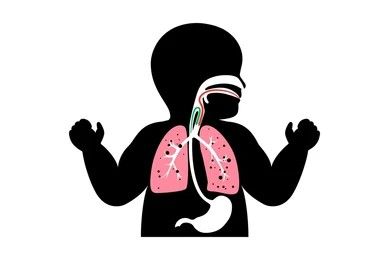What Causes It?
Bacterial infections (e.g., Streptococcus pneumoniae, Haemophilus influenzae)
Viral infections (e.g., influenza, respiratory syncytial virus – RSV)
Fungal infections (rare, usually in immunocompromised children)
Weakened immune system due to malnutrition or chronic illness
Aspiration pneumonia from inhaling food, liquid, or foreign objects
Exposure to environmental irritants like smoke or pollutants
Signs & Symptoms
Persistent cough (dry or productive)
Fever and chills
Fast or labored breathing
Wheezing or grunting sounds while breathing
Chest pain or discomfort
Loss of appetite
Fatigue and irritability
Bluish lips or fingertips (in severe cases)
